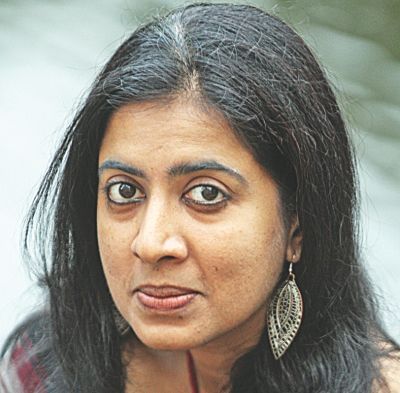The Space between Adventure and Anchorage

Photo: Palash Khan
Arundhathi Subramaniam is a voice that stands strong in the realm of modern poetry -- her poems explore various ambivalences with bottlenecks and surprises in a 'third world megalopolis' myth, the politics of culture and gender, and the persistent trope of the existential journey. Her works are characterised by contradictory impulses -- the desire for adventure and anchorage, expansion and containment, vulnerability and strength, freedom and belonging, withdrawal and engagement. Her recent book “Where I live” combines Arundhathi's first two Indian collections of poetry. Arundhathi was at Hay Festival Dhaka yesterday and spoke to The Daily Star.
Many of your pieces explore the relationship between space and emotions. Tell us about that.
Arundhathi: I feel that it is important to be anchored, and yet have a sense of adventure to write about what is inside of you. You cannot talk about anything universal without feeling the ground under your feet and the space that you are in. Be true to yourself, be concrete. Sometimes we are in a hurry to arrive to abstraction, but being anchored is essential to reach the stars.
An Irish poet once told me, “I like writing about the 'thingness' of ideas, the crunchiness of ideas, smokiness of things, not just the spirit but the matter as well.”
Poetry now seems to be shifting to sociology rather than sensuality or emotions. What do you think of that?
Arundhathi: A great pressure in put on artists today to be relevant. Sometimes you are pushed into a position to take a stand. I believe that is what newspapers are supposed to do, but not necessarily poets. If you are all about content and without form, then your poem is not complete, and a form without content is not poetry. A poem needs an emotional access, otherwise it is not full.
What would you say to the new generation of poets, especially women?
Arundhathi: I would tell them, please do not be afraid to grow into yourself. Our parents and teachers don't tell us this enough but the only thing worth doing is “growing into yourself,” and that means including people, including space and being comfortable in your own skin. True poetry comes from your heart, your marrow. But it is okay to be an apprentice, write like others, use their voices, and through that you might find your own voice, and your readers will recognise it.
Whom do you write for?
Arundhathi: I have this shadowy phantom ideal reader whom I write for, who resembles me to an extent. I write for that phantom who holds the art of listening, and whom I listen to as well. You are not a writer if you are not a listener.
Thoughts on Hay Festival Dhaka?
Arundhathi: I like the intimacy of Hay festivals. One of the achievements of Hay, and I have been to three, is that these festivals are able to combine a certain intimacy with the broadness of festivity. Often intimacy and festivals do not go together but Hay Festival Dhaka has kept that balance and it is wonderful. I also appreciated the thought that went into planning each session, which had at least one Bangladeshi personality along with the international ones. That thoughtfulness really came through.
What are you taking back with you?
Arundhathi: Recognition, familiarity, and kinship.
What do you think about the space South Asian writers occupy now?
Arundhathi: I think, where one lives is not necessarily where they belong, I don't know where I belong but I know where I do not belong. I know the gap created by nostalgia and I like exploring that gap and somewhere that gap gets mended in moments, through experiences. I think Indian/Bangladeshi/ Pakistani writers have an advantage, and we are now in an exciting time, where the complexity of our beings, of our surroundings, is our treasure. The fact that we do not belong to a monoculture helps our writing to be diverse. We should see this complexity as a benefit and not a conflict. We live in a place of richness and that is something to celebrate and write about.

 For all latest news, follow The Daily Star's Google News channel.
For all latest news, follow The Daily Star's Google News channel. 



Comments